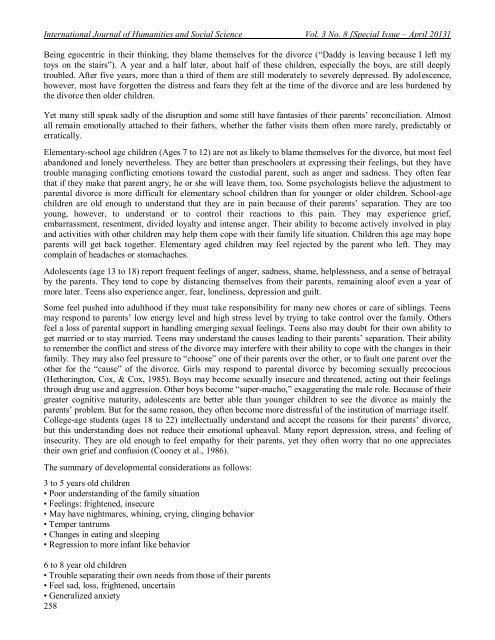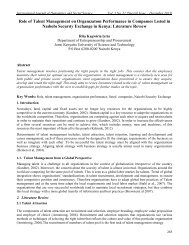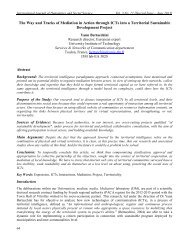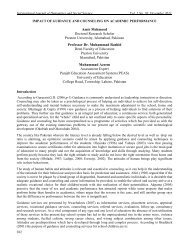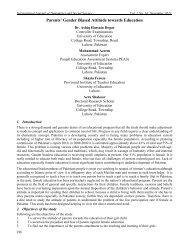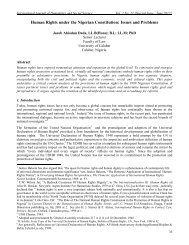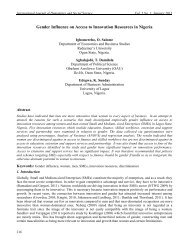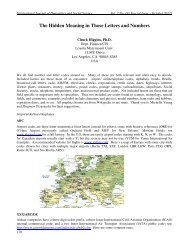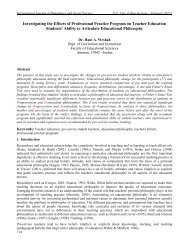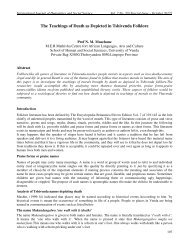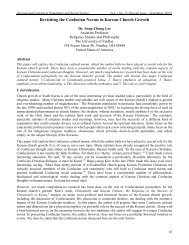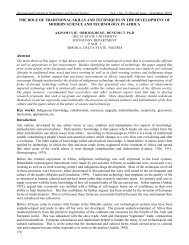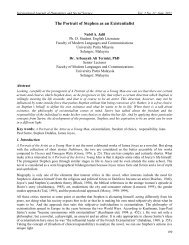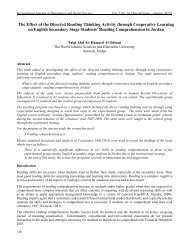Comparison of Single and Two Parents Children in terms of ...
Comparison of Single and Two Parents Children in terms of ...
Comparison of Single and Two Parents Children in terms of ...
You also want an ePaper? Increase the reach of your titles
YUMPU automatically turns print PDFs into web optimized ePapers that Google loves.
International Journal <strong>of</strong> Humanities <strong>and</strong> Social Science Vol. 3 No. 8 [Special Issue – April 2013]<br />
Be<strong>in</strong>g egocentric <strong>in</strong> their th<strong>in</strong>k<strong>in</strong>g, they blame themselves for the divorce (“Daddy is leav<strong>in</strong>g because I left my<br />
toys on the stairs”). A year <strong>and</strong> a half later, about half <strong>of</strong> these children, especially the boys, are still deeply<br />
troubled. After five years, more than a third <strong>of</strong> them are still moderately to severely depressed. By adolescence,<br />
however, most have forgotten the distress <strong>and</strong> fears they felt at the time <strong>of</strong> the divorce <strong>and</strong> are less burdened by<br />
the divorce then older children.<br />
Yet many still speak sadly <strong>of</strong> the disruption <strong>and</strong> some still have fantasies <strong>of</strong> their parents‟ reconciliation. Almost<br />
all rema<strong>in</strong> emotionally attached to their fathers, whether the father visits them <strong>of</strong>ten more rarely, predictably or<br />
erratically.<br />
Elementary-school age children (Ages 7 to 12) are not as likely to blame themselves for the divorce, but most feel<br />
ab<strong>and</strong>oned <strong>and</strong> lonely nevertheless. They are better than preschoolers at express<strong>in</strong>g their feel<strong>in</strong>gs, but they have<br />
trouble manag<strong>in</strong>g conflict<strong>in</strong>g emotions toward the custodial parent, such as anger <strong>and</strong> sadness. They <strong>of</strong>ten fear<br />
that if they make that parent angry, he or she will leave them, too. Some psychologists believe the adjustment to<br />
parental divorce is more difficult for elementary school children than for younger or older children. School-age<br />
children are old enough to underst<strong>and</strong> that they are <strong>in</strong> pa<strong>in</strong> because <strong>of</strong> their parents‟ separation. They are too<br />
young, however, to underst<strong>and</strong> or to control their reactions to this pa<strong>in</strong>. They may experience grief,<br />
embarrassment, resentment, divided loyalty <strong>and</strong> <strong>in</strong>tense anger. Their ability to become actively <strong>in</strong>volved <strong>in</strong> play<br />
<strong>and</strong> activities with other children may help them cope with their family life situation. <strong>Children</strong> this age may hope<br />
parents will get back together. Elementary aged children may feel rejected by the parent who left. They may<br />
compla<strong>in</strong> <strong>of</strong> headaches or stomachaches.<br />
Adolescents (age 13 to 18) report frequent feel<strong>in</strong>gs <strong>of</strong> anger, sadness, shame, helplessness, <strong>and</strong> a sense <strong>of</strong> betrayal<br />
by the parents. They tend to cope by distanc<strong>in</strong>g themselves from their parents, rema<strong>in</strong><strong>in</strong>g alo<strong>of</strong> even a year <strong>of</strong><br />
more later. Teens also experience anger, fear, lonel<strong>in</strong>ess, depression <strong>and</strong> guilt.<br />
Some feel pushed <strong>in</strong>to adulthood if they must take responsibility for many new chores or care <strong>of</strong> sibl<strong>in</strong>gs. Teens<br />
may respond to parents‟ low energy level <strong>and</strong> high stress level by try<strong>in</strong>g to take control over the family. Others<br />
feel a loss <strong>of</strong> parental support <strong>in</strong> h<strong>and</strong>l<strong>in</strong>g emerg<strong>in</strong>g sexual feel<strong>in</strong>gs. Teens also may doubt for their own ability to<br />
get married or to stay married. Teens may underst<strong>and</strong> the causes lead<strong>in</strong>g to their parents‟ separation. Their ability<br />
to remember the conflict <strong>and</strong> stress <strong>of</strong> the divorce may <strong>in</strong>terfere with their ability to cope with the changes <strong>in</strong> their<br />
family. They may also feel pressure to “choose” one <strong>of</strong> their parents over the other, or to fault one parent over the<br />
other for the “cause” <strong>of</strong> the divorce. Girls may respond to parental divorce by becom<strong>in</strong>g sexually precocious<br />
(Hether<strong>in</strong>gton, Cox, & Cox, 1985). Boys may become sexually <strong>in</strong>secure <strong>and</strong> threatened, act<strong>in</strong>g out their feel<strong>in</strong>gs<br />
through drug use <strong>and</strong> aggression. Other boys become “super-macho,” exaggerat<strong>in</strong>g the male role. Because <strong>of</strong> their<br />
greater cognitive maturity, adolescents are better able than younger children to see the divorce as ma<strong>in</strong>ly the<br />
parents‟ problem. But for the same reason, they <strong>of</strong>ten become more distressful <strong>of</strong> the <strong>in</strong>stitution <strong>of</strong> marriage itself.<br />
College-age students (ages 18 to 22) <strong>in</strong>tellectually underst<strong>and</strong> <strong>and</strong> accept the reasons for their parents‟ divorce,<br />
but this underst<strong>and</strong><strong>in</strong>g does not reduce their emotional upheaval. Many report depression, stress, <strong>and</strong> feel<strong>in</strong>g <strong>of</strong><br />
<strong>in</strong>security. They are old enough to feel empathy for their parents, yet they <strong>of</strong>ten worry that no one appreciates<br />
their own grief <strong>and</strong> confusion (Cooney et al., 1986).<br />
The summary <strong>of</strong> developmental considerations as follows:<br />
3 to 5 years old children<br />
• Poor underst<strong>and</strong><strong>in</strong>g <strong>of</strong> the family situation<br />
• Feel<strong>in</strong>gs: frightened, <strong>in</strong>secure<br />
• May have nightmares, wh<strong>in</strong><strong>in</strong>g, cry<strong>in</strong>g, cl<strong>in</strong>g<strong>in</strong>g behavior<br />
• Temper tantrums<br />
• Changes <strong>in</strong> eat<strong>in</strong>g <strong>and</strong> sleep<strong>in</strong>g<br />
• Regression to more <strong>in</strong>fant like behavior<br />
6 to 8 year old children<br />
• Trouble separat<strong>in</strong>g their own needs from those <strong>of</strong> their parents<br />
• Feel sad, loss, frightened, uncerta<strong>in</strong><br />
• Generalized anxiety<br />
258


